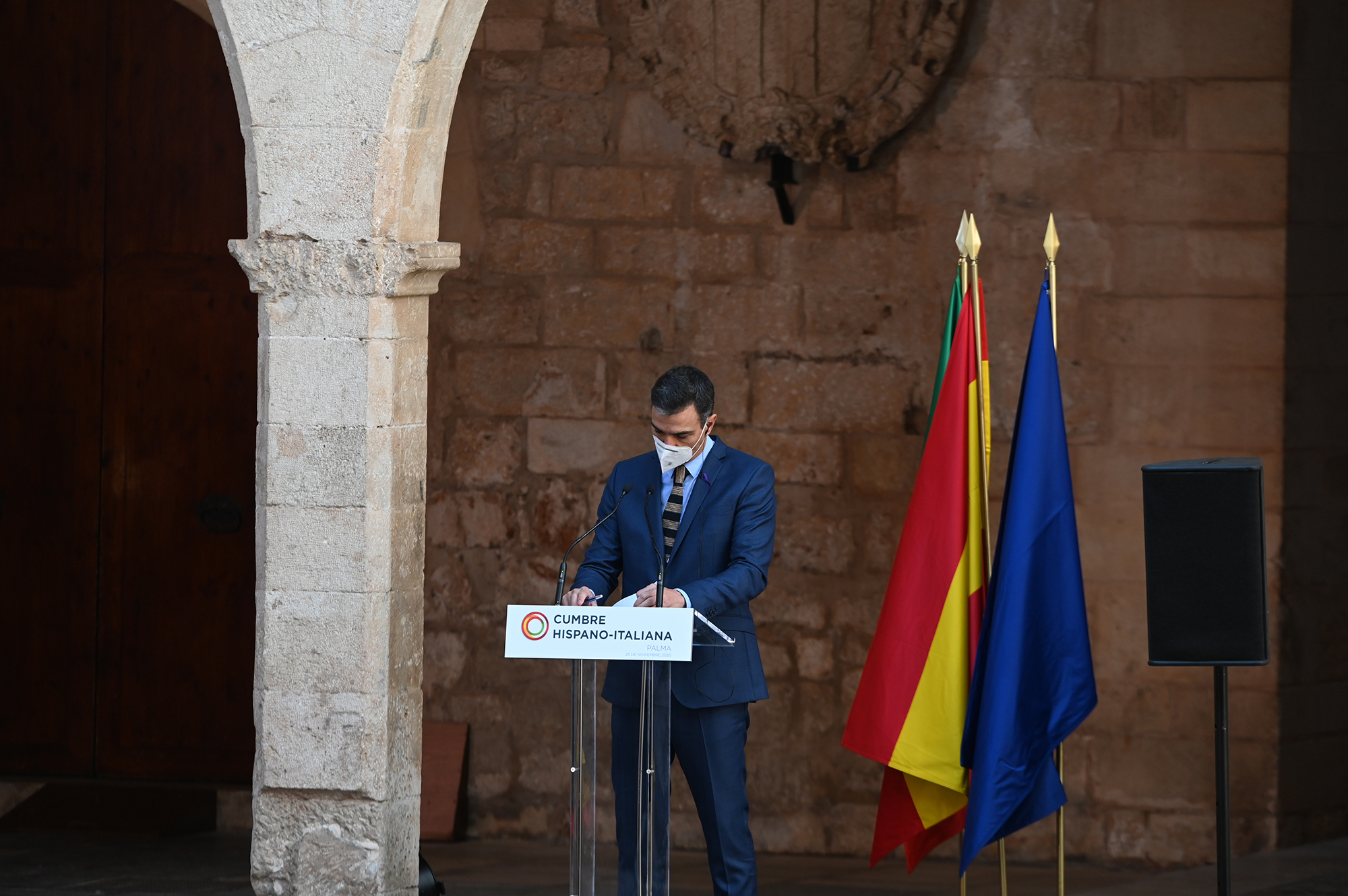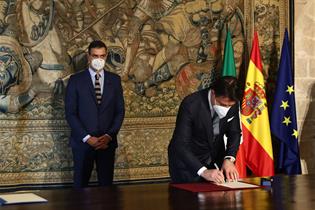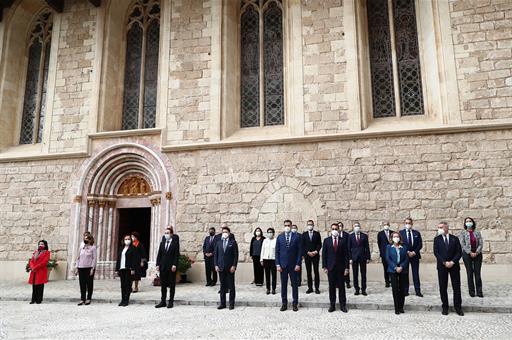President of the Government attends 19th Spain-Italy Summit
Pedro Sánchez commits to strategic relationship between Spain and Italy to strengthen synergies between the two countries
President's News - 2020.11.25
Royal Palace of La Almudaina, Palma (Mallorca)
Pedro Sánchez and Guiseppe Conte stressed the need for a European response to the economic and social crisis stemming from the health emergency during the negotiations on the European Recovery Fund within the framework of the "Next Generation EU". In this regard, the two countries are seeking synergies in their respective national plans to collaborate on.
The President of the Government underlined that this meeting has been a summit to agree on action, stemming from the "empathy between our countries and our peoples", since "now is the time to develop recovery and resilience plans and identify industrial synergies between our two countries" and Europe. On this matter, Pedro Sánchez recalled a conversation with Guiseppe Conte in which they remarked that the population of Spain and Italy together accounts for 25% of that of the European Union, and close to 25% of its GDP, which "means that, when we speak with a single voice, this voice amounts to no more and no less than a quarter part of the EU".
Pedro Sánchez and Guiseppe Conte agreed on a broad Joint Declaration that reflects the extent of the intense relations between the two countries and the ambition of these governments to ensure that these relations, which are already close in civil society, are even more so in terms of collaboration between the two governments. This extensive Declaration contains an in-depth study of the existing synergies between the two countries and the ambitious challenges of the future on such issues as the ecological transition, digital transformation, demographic challenge, strengthening of economic and trade ties, business and industrial cooperation, tourism, social rights, employment, science and technology, agriculture and the 2030 Agenda.
The Summit included the attendance of the Second Vice-President of the Government and Minister for Social Rights and 2030 Agenda; the Third Vice-President of the Government and Minister for Economic Affairs and Digital Transformation; the Fourth Vice-President of the Government and Minister for Ecological Transition and Demographic Challenge; the Minister for Foreign Affairs, European Union and Cooperation; the Minister for Defence; the Minister for Home Affairs; the Minister for Work; the Minister for Industry, Trade and Tourism; the Minister for Agriculture, Fisheries and Food; and the Minister for Inclusion, Social Security and Migration, and their Italian counterparts.
Southern Neighbourhood and Pact on Migration and Asylum
 Foto: Pool Moncloa/Borja Puig de la BellacasaThe President of the Government of Spain and the Prime Minister for Italy agreed on a "non-paper", to give a renewed boost to EU relations with the Southern Neighbourhood and so that the EU-27 looks to the Mediterranean once again. The text, which includes 10 work areas, underlines the confidence of both countries in the contribution that these relations will give to enhancing the stability and economic dynamism of both the Member States and partner countries in the south. This document has been forwarded to the German Rotating Presidency, the European Council and the European Commission.
Foto: Pool Moncloa/Borja Puig de la BellacasaThe President of the Government of Spain and the Prime Minister for Italy agreed on a "non-paper", to give a renewed boost to EU relations with the Southern Neighbourhood and so that the EU-27 looks to the Mediterranean once again. The text, which includes 10 work areas, underlines the confidence of both countries in the contribution that these relations will give to enhancing the stability and economic dynamism of both the Member States and partner countries in the south. This document has been forwarded to the German Rotating Presidency, the European Council and the European Commission.
Among the matters of interest that the two countries share is migration. Accordingly, and coinciding with the Summit, Pedro Sánchez and Guiseppe Conte announced another "non-paper" on their position on the new Pact on Migration and Asylum, which is also backed by Malta and Greece.
President of the Government Sánchez stated, "The documents is a bold and courageous proposal to encourage debate at an EU level on the Pact on Migration", since this new Pact is a "constructive starting point for our joint work" and addresses the need to find a real balance between solidarity and shared responsibility" between countries, revise border procedures and invest in political relations with our migration partners, particularly with neighbouring countries to the south. The "non-paper" also proposes to find safe channels to coordinate migration and asylum that reduce illegal flows and contribute to orderly management, with a positive impact on both countries of destination, and on countries of origin and transit.
Three memoranda of understanding
 Pool Moncloa/Fernando CalvoThe importance of the ambitious initiatives contained in the Joint Declaration was underpinned by the signing of a Memorandum of Understanding (MOU) designed to organise collaboration in all these issues of common interest. This document contains the regularisation of political contacts between the foreign affairs ministries and was endorsed by the corresponding ministers. Another of these MOUs includes the exchange of experiences on the social economy and the minimum wage, signed by the ministers for work. And the third, signed by the ministers for industry, trade and tourism, contains issues of cooperation at an industrial level, including the matter of hydrogen as a potential area of collaboration between the two countries
Pool Moncloa/Fernando CalvoThe importance of the ambitious initiatives contained in the Joint Declaration was underpinned by the signing of a Memorandum of Understanding (MOU) designed to organise collaboration in all these issues of common interest. This document contains the regularisation of political contacts between the foreign affairs ministries and was endorsed by the corresponding ministers. Another of these MOUs includes the exchange of experiences on the social economy and the minimum wage, signed by the ministers for work. And the third, signed by the ministers for industry, trade and tourism, contains issues of cooperation at an industrial level, including the matter of hydrogen as a potential area of collaboration between the two countries
In this regard, Pedro Sánchez highlighted that now is the time to "look for industrial synergies between the two countries, such as through a commitment to green hydrogen, where there is ample potential for cooperation". The Government of Spain is committed to renewable hydrogen as a key sustainable solution to guarantee climate neutrality by the year 2050. In the long term, hydrogen could prove to be essential to store energy in a 100% renewable electricity system.
International Day for Elimination of Violence against Women
During the Summit, Pedro Sánchez and Guiseppe Conte signed a Declaration on the International Day for the Elimination of Violence against Women. The President of the Government dedicated a few words to the memory of the victims and underlined the commitment of the Government of Spain to do away with this "intolerable social scourge".
The two leaders undertake in the text to "incorporate the goal of eradicating violence against women in action by the European Union as an inseparable part of our democratic and egalitarian framework, also recalling that gender equality is a fundamental element of the EU and an essential part of the European pillar of social rights".
Non official translation
More Info
- Transcript of the speech by President of Government at the 19th Spain-Italy Summit press conference
- Joint Declaration of the 19th Spain-Italy Summit
- Joint declaration on the occasion of the International Day for the Elimination of Violence against Women (PDF)
- New Pact on Migration and Asylum (PDF)
- Yolanda Díaz and her Italian counterpart, Nunzia Catalfo, sign a Memorandum of Understanding on minimum wage and social economy (2020/11/25)
- Spain and Italy praise agreement on PAC and step up their commitment to sustainability of fisheries in Western Mediterranean (2020/11/25)
- Spain and Italy promote cooperation in digital and ecological transition of industry (2020/11/25)





